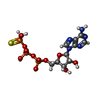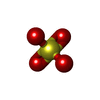Entry Database : PDB / ID : 3fzpTitle Crystal structure of PYK2 complexed with ATPgS Protein tyrosine kinase 2 beta Keywords / / / / / / / / / / / / Function / homology Function Domain/homology Component
/ / / / / / / / / / / / / / / / / / / / / / / / / / / / / / / / / / / / / / / / / / / / / / / / / / / / / / / / / / / / / / / / / / / / / / / / / / / / / / / / / / / / / / / / / / / / / / / / / / / / / / / / / / / / / / / / / / / / / / / / / / / / / / / / / / / / / / / / / / / / / Biological species Homo sapiens (human)Method / / / Resolution : 2.1 Å Authors Han, S. Journal : J.Biol.Chem. / Year : 2009Title : Structural characterization of proline-rich tyrosine kinase 2 (PYK2) reveals a unique (DFG-out) conformation and enables inhibitor design.Authors : Han, S. / Mistry, A. / Chang, J.S. / Cunningham, D. / Griffor, M. / Bonnette, P.C. / Wang, H. / Chrunyk, B.A. / Aspnes, G.E. / Walker, D.P. / Brosius, A.D. / Buckbinder, L. History Deposition Jan 26, 2009 Deposition site / Processing site Revision 1.0 Mar 31, 2009 Provider / Type Revision 1.1 Jul 13, 2011 Group Revision 1.2 Feb 21, 2024 Group / Database references / Derived calculationsCategory chem_comp_atom / chem_comp_bond ... chem_comp_atom / chem_comp_bond / database_2 / struct_site Item _database_2.pdbx_DOI / _database_2.pdbx_database_accession ... _database_2.pdbx_DOI / _database_2.pdbx_database_accession / _struct_site.pdbx_auth_asym_id / _struct_site.pdbx_auth_comp_id / _struct_site.pdbx_auth_seq_id
Show all Show less
 Open data
Open data Basic information
Basic information Components
Components Keywords
Keywords Function and homology information
Function and homology information Homo sapiens (human)
Homo sapiens (human) X-RAY DIFFRACTION /
X-RAY DIFFRACTION /  SYNCHROTRON /
SYNCHROTRON /  FOURIER SYNTHESIS / Resolution: 2.1 Å
FOURIER SYNTHESIS / Resolution: 2.1 Å  Authors
Authors Citation
Citation Journal: J.Biol.Chem. / Year: 2009
Journal: J.Biol.Chem. / Year: 2009 Structure visualization
Structure visualization Molmil
Molmil Jmol/JSmol
Jmol/JSmol Downloads & links
Downloads & links Download
Download 3fzp.cif.gz
3fzp.cif.gz PDBx/mmCIF format
PDBx/mmCIF format pdb3fzp.ent.gz
pdb3fzp.ent.gz PDB format
PDB format 3fzp.json.gz
3fzp.json.gz PDBx/mmJSON format
PDBx/mmJSON format Other downloads
Other downloads 3fzp_validation.pdf.gz
3fzp_validation.pdf.gz wwPDB validaton report
wwPDB validaton report 3fzp_full_validation.pdf.gz
3fzp_full_validation.pdf.gz 3fzp_validation.xml.gz
3fzp_validation.xml.gz 3fzp_validation.cif.gz
3fzp_validation.cif.gz https://data.pdbj.org/pub/pdb/validation_reports/fz/3fzp
https://data.pdbj.org/pub/pdb/validation_reports/fz/3fzp ftp://data.pdbj.org/pub/pdb/validation_reports/fz/3fzp
ftp://data.pdbj.org/pub/pdb/validation_reports/fz/3fzp Links
Links Assembly
Assembly
 Components
Components Homo sapiens (human)
Homo sapiens (human) X-RAY DIFFRACTION
X-RAY DIFFRACTION Sample preparation
Sample preparation SYNCHROTRON / Site:
SYNCHROTRON / Site:  APS
APS  / Beamline: 17-ID
/ Beamline: 17-ID Processing
Processing FOURIER SYNTHESIS / Resolution: 2.1→30 Å / Cor.coef. Fo:Fc: 0.946 / Cor.coef. Fo:Fc free: 0.925 / SU B: 5.401 / SU ML: 0.147 / Cross valid method: THROUGHOUT / ESU R: 0.271 / ESU R Free: 0.199 / Stereochemistry target values: MAXIMUM LIKELIHOOD
FOURIER SYNTHESIS / Resolution: 2.1→30 Å / Cor.coef. Fo:Fc: 0.946 / Cor.coef. Fo:Fc free: 0.925 / SU B: 5.401 / SU ML: 0.147 / Cross valid method: THROUGHOUT / ESU R: 0.271 / ESU R Free: 0.199 / Stereochemistry target values: MAXIMUM LIKELIHOOD Movie
Movie Controller
Controller







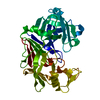
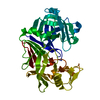

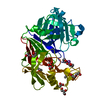


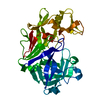
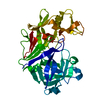
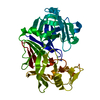
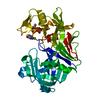
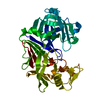
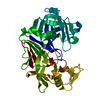
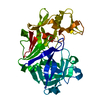
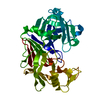
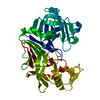
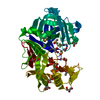
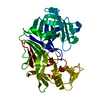

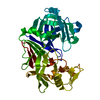
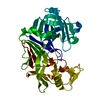
 PDBj
PDBj



